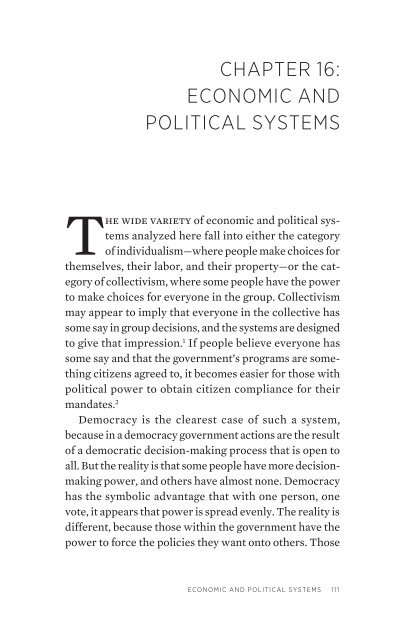url?sa=t&source=web&cd=1&ved=0CCYQFjAA&url=http://mercatus.org/sites/default/files/Holcombe_Cronyism_web
url?sa=t&source=web&cd=1&ved=0CCYQFjAA&url=http://mercatus.org/sites/default/files/Holcombe_Cronyism_web
url?sa=t&source=web&cd=1&ved=0CCYQFjAA&url=http://mercatus.org/sites/default/files/Holcombe_Cronyism_web
You also want an ePaper? Increase the reach of your titles
YUMPU automatically turns print PDFs into web optimized ePapers that Google loves.
CHAPTER 16:<br />
ECONOMIC AND<br />
POLITICAL SYSTEMS<br />
The wide variety of economic and political systems<br />
analyzed here fall into either the category<br />
of individualism—where people make choices for<br />
themselves, their labor, and their property—or the category<br />
of collectivism, where some people have the power<br />
to make choices for everyone in the group. Collectivism<br />
may appear to imply that everyone in the collective has<br />
some say in group decisions, and the systems are designed<br />
to give that impression. 1 If people believe everyone has<br />
some say and that the government’s programs are something<br />
citizens agreed to, it becomes easier for those with<br />
political power to obtain citizen compliance for their<br />
mandates. 2<br />
Democracy is the clearest case of such a system,<br />
because in a democracy government actions are the result<br />
of a democratic decision-making process that is open to<br />
all. But the reality is that some people have more decisionmaking<br />
power, and others have almost none. Democracy<br />
has the symbolic advantage that with one person, one<br />
vote, it appears that power is spread evenly. The reality is<br />
different, because those within the government have the<br />
power to force the policies they want onto others. Those<br />
ECONOMIC AND POLITICAL SYSTEMS 111


